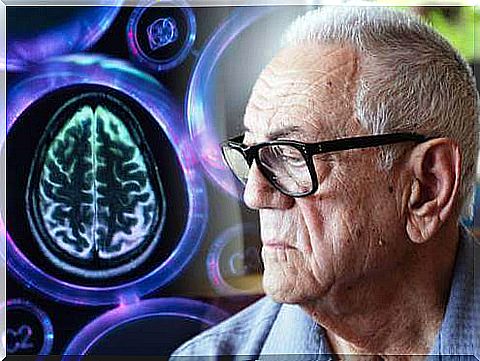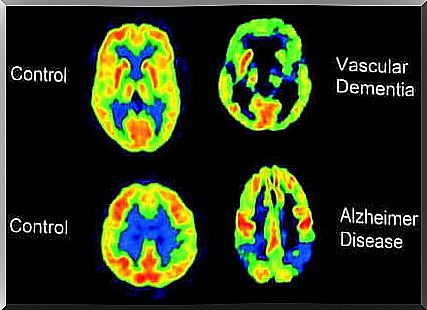What Is Vascular Dementia?

Vascular dementia is, after Alzheimer’s disease, the most common neurodegenerative disease in people over 70 years of age. The origin of this pathology is found in blood circulation problems, which hamper the arrival of blood to the brain.
It is a slow and progressive disease. The latter has an impact on the quality of life of the person since it affects their memory, movements, communication …
It should be noted that vascular dementia is not, to date, a reversible disease. However, the effects can be slowed down, but unfortunately we do not have treatments capable of stopping or effectively treating this painful reality that hundreds of people and their families are experiencing.
However, unlike Alzheimer’s disease, this type of dementia has certain factors that can be protective or trigger, depending on the case. These factors can be controlled to some extent. This does not mean that this disease can be prevented 100%, but it can reduce the risk or delay its onset.
Vascular dementia is indeed linked to well-known underlying factors. Among them are high blood pressure, high cholesterol and triglycerides, diabetes, overweight or an unhealthy lifestyle.
Improving vascular health is within everyone’s reach. So let’s see what are the characteristics of this disease which represents about 20% of dementia diagnoses made each year.

What is vascular dementia?
Vascular dementia is a neurodegenerative disease that causes cognitive impairment. It is caused by various vascular lesions and alterations, the most common of which are:
- A narrowing of the blood vessels in the brain as a result of arteriosclerosis.
- Multiple lacunar infarctions that usually occur in both the gray matter and the white matter of the deep hemisphere.
- A cerebral infarction in key areas of the brain, such as the angular gyrus or the thalamus.
- A subcortical arteriosclerotic encephalopathy.
- Thrombosis and embolism.
On the other hand, a study carried out by Dr Constantino Ladecola and published in the journal Neuron shows that vascular dementia originates from an alteration of blood vessels. However, the problem is not just this problem of sending oxygen and nutrients to the brain.
There are also the changes undergone by neurons and glial cells. It is in these areas that internal homeostasis changes and that communication between them is impaired.

Why does this neurodegenerative disease appear?
As we pointed out at the beginning, vascular dementia is linked to certain risk factors. So, experts point out that on average, this disease begins to manifest itself around the age of 60. However, her symptoms become more marked from the age of 70.
It should also be noted that its occurrence is more common in men. The triggers that usually cause vascular dementia are:
- The tobacco.
- High blood pressure.
- High cholesterol.
- Diabetes.
- Obesity
- Physical inactivity
- Previous heart problems.
- Having had a stroke in the past.
- In many cases, vascular dementia is also associated with brain aging itself.
Symptoms of vascular dementia
The symptoms associated with vascular dementia are slow and progressive. Often, they are interpreted as mere absences of mind or changes in mood.
However, there comes a time when a person’s functioning is clearly impaired. This is when the patient’s family usually seeks help and requests a medical evaluation. The most obvious symptoms of this disease are usually the following:
- Motor skills problems. The most obvious characteristics of a vascular problem are manifested in the movements of the person. They are then stiffer, slower and more clumsy.
- Reasoning problems. There are indeed memory failures, deficits in understanding, thinking, paying attention, planning and even difficulty maintaining a logical conversation.
- Mood disorders. This is also a fairly obvious feature. The person suffers from mood swings. She is listless, demotivated, angry and can even sometimes show a certain aggressiveness … All of this can often be mistaken for depression when there is in fact an underlying irreversible cause linked to vascular dementia.
- Finally, delusions and hallucinations.
There is also an element on which we must emphasize. Symptoms associated with vascular dementia may vary depending on the location of the infarction and vascular damage.
Thus, one of the first manifestations that we can see appear in the patient can be a certain motor awkwardness but also an inability to communicate. Finally, sometimes these difficulties arise suddenly, but other times it happens more slowly.
What treatments are available for people with vascular dementia?
The damage caused by vascular dementia is not reversible. However, they can be slowed down. Hence the importance of early detection, evaluation and subsequent diagnostic tests with imaging tests (CT, MRI, etc.).
Once the brain damage has been assessed, it is time to determine the factors that triggered the condition. For example, a heart problem. Then we treat the causes of the disease. The treatments are adapted to the personal reality of each patient as well as to the phase in which he is.
- Usually, a series of drugs are given to treat the symptoms and at the same time slow the progression of the disease.
- The person should also follow a neuro-rehabilitation program. It works on memory, understanding, attention, etc.
- Finally, multidisciplinary programs are often favored. Thus, the person can count on psychological assistance, physiotherapy, speech therapy and even occupational therapy.
In any case, family support is another element that must be taken into account. We cannot ignore the fact that we are facing such a difficult and exhausting situation here. Indeed, it brings into play emotions, resources and demands for which we are not always prepared.









